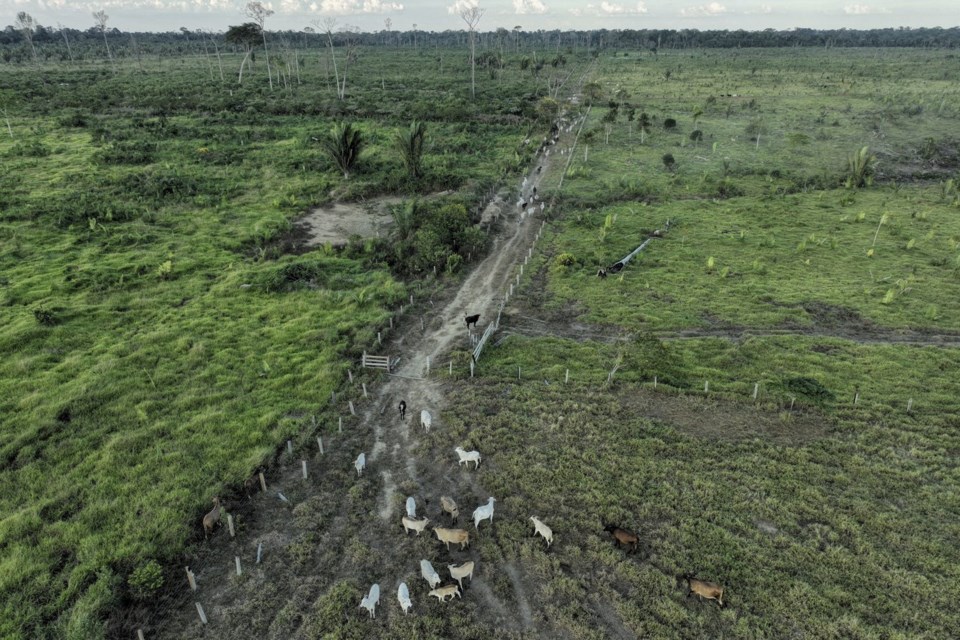SAO PAULO, Brazil (AP) â With little fanfare and virtually no publicity, lawmakers in the Brazilian state of have passed legislation in favor of hundreds of cattle ranchers who had illegally converted swathes of into pasture land.
The new legislation, which was passed April 28 and took effect immediately, also grants amnesty to slaughterhouses that purchased cattle illegally raised inside what had been the conservation area, which the new law effectively dissolves.
âAąôąô and other administrative penalties tied to the occupation and use of the area are automatically voided and carry no legal or financial consequences,â declared the law.
One of the beneficiaries of the amnesty is likely to be JBS SA, the worldâs largest meatpacker, which is poised to start on the New York Stock Exchange in June. According to a 2023 audit by BrazilÂīs Federal Prosecution Service, 12% of cattle purchased by JBS in Rondonia came from illegally deforested areas.
In exchange for the amnesty, cattle ranchers must join Rondonia's environmental regularization program, which requires them to and submit a plan to reforest part of the area. The law does not give them the public land, but allows it to be used under concession for 30 years. They will also be allowed to sell cattle, despite a law forbidding commercial cattle in Brazil's protected areas. Around 216,000 head graze on pasture there, according to the state animal division.
âThe law is an affront. If itâs not declared unconstitutional, it will pose one of the greatest threats to the protection of all conservation areas facing land invasions,â said Wellington Lamburgini, a coordinator with the local chapter of the Pastoral Land Commission, a nonprofit affiliated with the Catholic Church. âIt sends the message that this crime is tolerated and will eventually be legalized.â
State lawmaker LuÃs do Hospital, who sponsored the bill, Alex Redano, president of the state parliament, and JBS all declined to comment.
Legal loopholes
The expectation that illegally used land will become sanctioned has been the main driver of deforestation in the Amazon.
Land-grabbers clear land in hopes it will eventually be legalized due to lax land laws or government amnesties. In most cases, the forest is cleared for pasture to show economic activity.
In recent years, Rondoniaâs attorney generalâs office, state prosecutorâs office and environmental agency have fined and prosecuted hundreds of cattle ranchers and four slaughterhouses for causing damage inside the Jaci-Parana conservation area, where large-scale cattle raising is forbidden.
Fines and pending legal settlements total $280 million â a fraction of the more than $1 billion in damages state. Many of the 778 identified land invaders have never been prosecuted. While several have been convicted, most have escaped punishment due to legal loopholes.
The state prosecutor's office told The Associated Press it is considering appealing the new law.
The attorney general's office declined to comment.
In December 2023, the state's attorney and three other slaughterhouses for buying cattle raised in Jaci-Parana. Months later, two of the slaughterhouses â Distriboi and Frigon â were ordered, along with three cattle ranchers, for causing environmental damage. Neither company responded to requests for comment.
âCould cause immeasurable harmâ
JBS is facing three lawsuits pending trial. In one of them, the company argued that it has an environmental monitoring program that has blocked over 20,000 farms in Rondonia alone, according to the companyâs defense included in the court filings. It also states that the lawsuit is based on purchasing only 73 heads of cattle, representing 0.0006% of the companyÂīs purchases in the state.
According to the company, the transaction, which took place 12 years ago, involved fraud from the cattle rancher, as he used geographic coordinates outside the Jaci-Parana reserve to make the sale appear legal. The producer has since been blocked from further sales.
âThe mere existence of this lawsuit â even if ultimately unsuccessful â could cause immeasurable harm to JBS and, by extension, to Brazilâs economy, to which the company contributes significantly, accounting for roughly 2.1% of the national GDP," the company said in court filings.
In a statement to AP, the meatpacker said that starting Jan. 1, 2026, it will only buy cattle from producers enrolled in its Transparent Livestock Platform, which allows ranchers to register information about their own suppliers, who will also be subject to JBSâs socio-environmental compliance criteria.
Last month, the U.S. Securities and Exchange Commission approved the listing of JBS on the New York Stock Exchange despite strong opposition from environmental groups.
____
The Associated Pressâ climate and environmental coverage receives financial support from multiple private foundations. AP is solely responsible for all content. Find APâs for working with philanthropies, a list of supporters and funded coverage areas at .
Fabiano Maisonnave, The Associated Press



